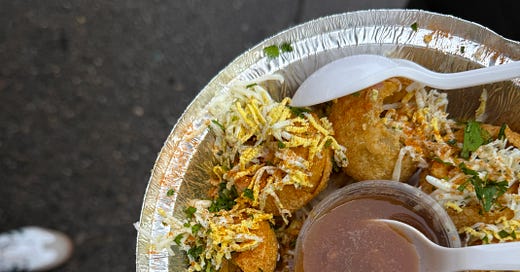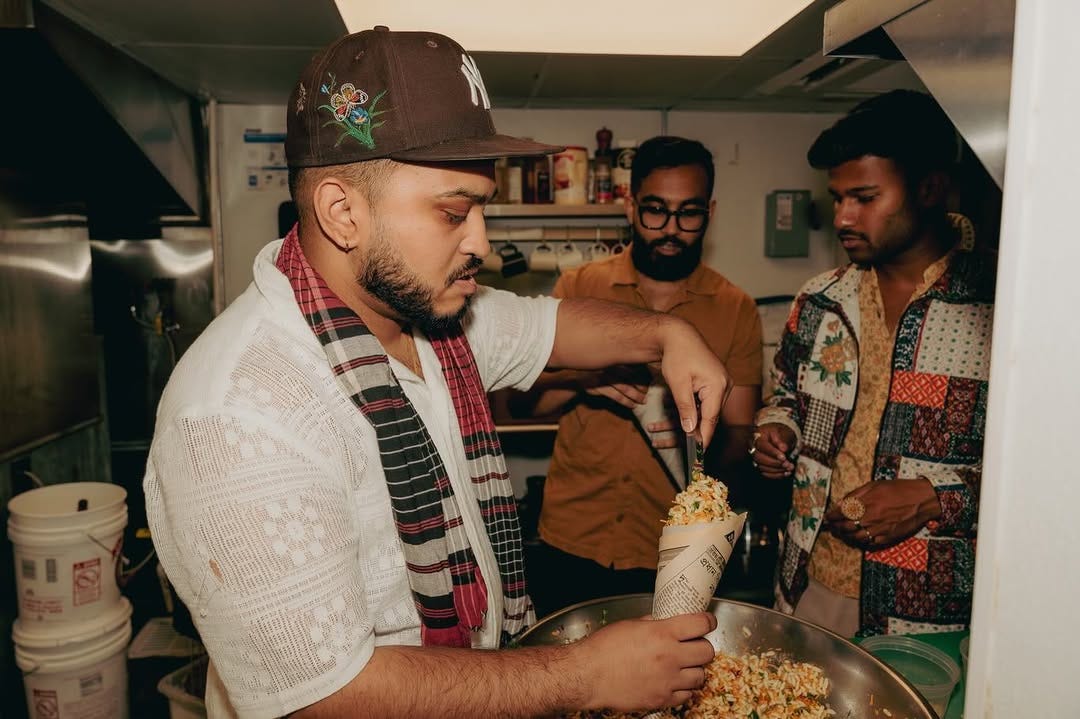If you believe the lore, there were no fuchka in New York City before 2018.
Fuchka is a Bangladeshi street food: crispy, hollow semolina balls filled with potato and chickpea, topped with onion and egg, and then dolloped individually with a sauce called “tamarind water”.
The first cart to sell them in New York, in 2018, was Tong. Now, there are 3 more carts adjacent to Tong on 37th Avenue in Jackson Heights: Fuska House, Fuchka Garden, and then, another Fuska House. “A garden between the 2 houses,” a vendor told me as he handed me a cup of malai cha, a sweet, milky tea that is simmered for over 2 and a half hours, until it develops a thicker texture. It costs $1.
But it turns out that there was at least one other vendor selling fuchka in New York prior to Tong. Jhal NYC was founded in 2015, as a mission-based collective focused on selling Bangladeshi food at the Queens Night Market. “At that time, the Queens Night Market had no South Asian vendors,” one of their members, Raunaq “Naq” Zamal, told me.
“Even though what you’re eating here is street food, you would have to get it inside of a restaurant before. So we thought, why don’t we just present it the way it’s historically been presented, as street food?”
Naq described the proliferation of fuchka carts in the Bangladeshi exclave of Jackson Heights as a “domino effect”. But now, a variety of other traditional Bangladeshi foods are being sold on the street, as well.
Rafi Islam, a founding member of Jhal NYC and now a member organizer at the Street Vendor Project, introduced me to the dish called bhuna kitchuri on a recent tour of the area. The owner of the cart on 37th Avenue, Parvez Dhali, was a restaurant cook back in Bangladesh. His heavily-seasoned beef bhuna is stewed for 2 hours, and served over kitchuri, a mixture of rice and lentils, then topped with red onion and cucumber.
“If you go to any restaurant, you’ll find this,” Rafi said, as I shoveled a bite into my mouth. “But to see that in a street cart? That’s honestly something incredible… This is definitely something new.”
The vendor next door played verses from the Quran over his speaker as I sampled both the beef and the tripe. The outside of each meat had a sheen from the ghee it was cooked in, which was mixed with spices and aromatics and had become like a paste of pure flavor. The only thing that could have made it better was if I’d eaten it with my hands.



Watch part 1 of the Bangladeshi Street Food series with Rafi here.
Stop #2 - A beef cutlet with fried flat bread, and spicy brain
Keep reading with a 7-day free trial
Subscribe to People & Food to keep reading this post and get 7 days of free access to the full post archives.






